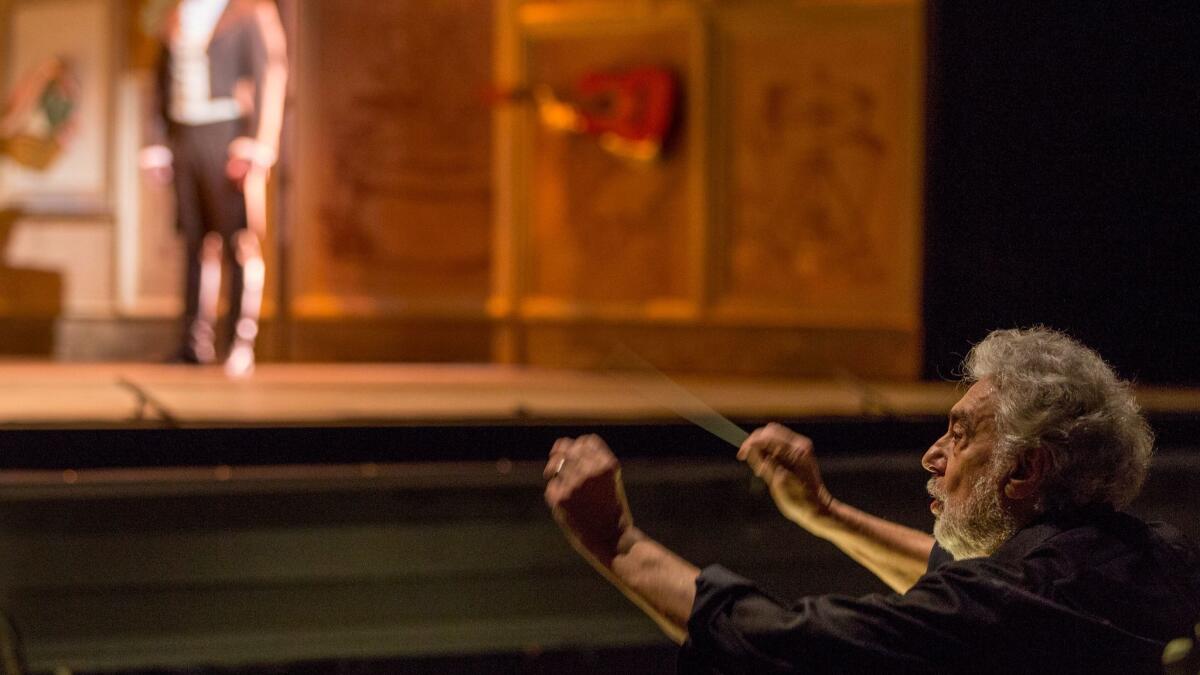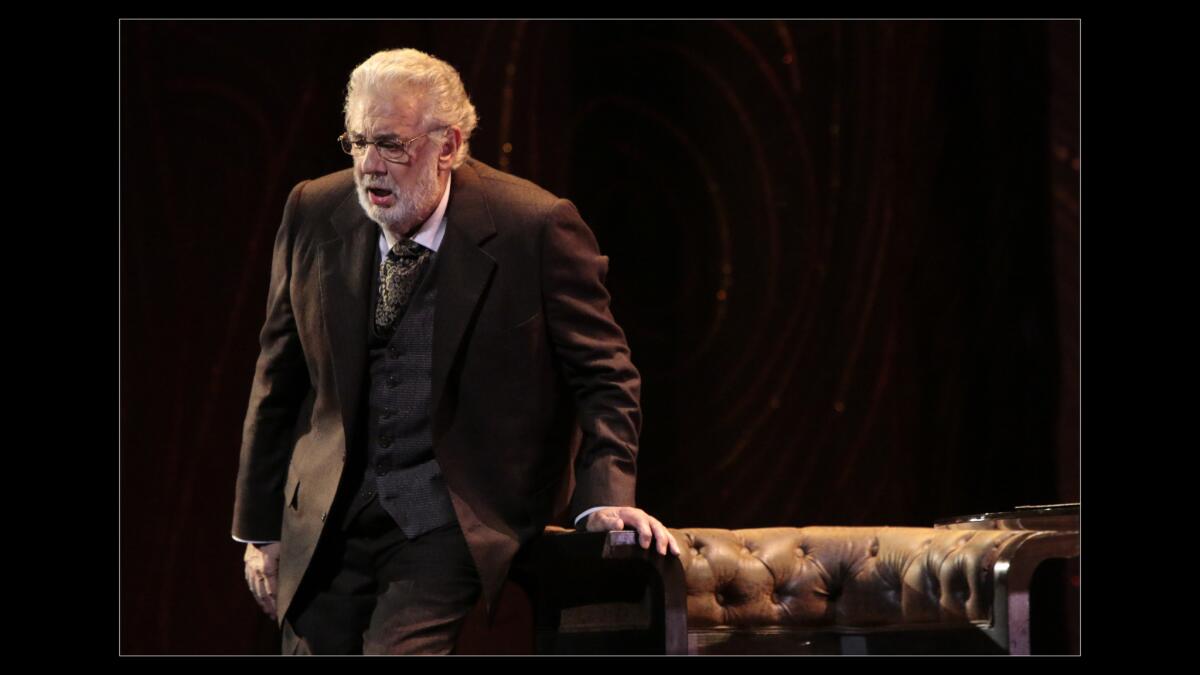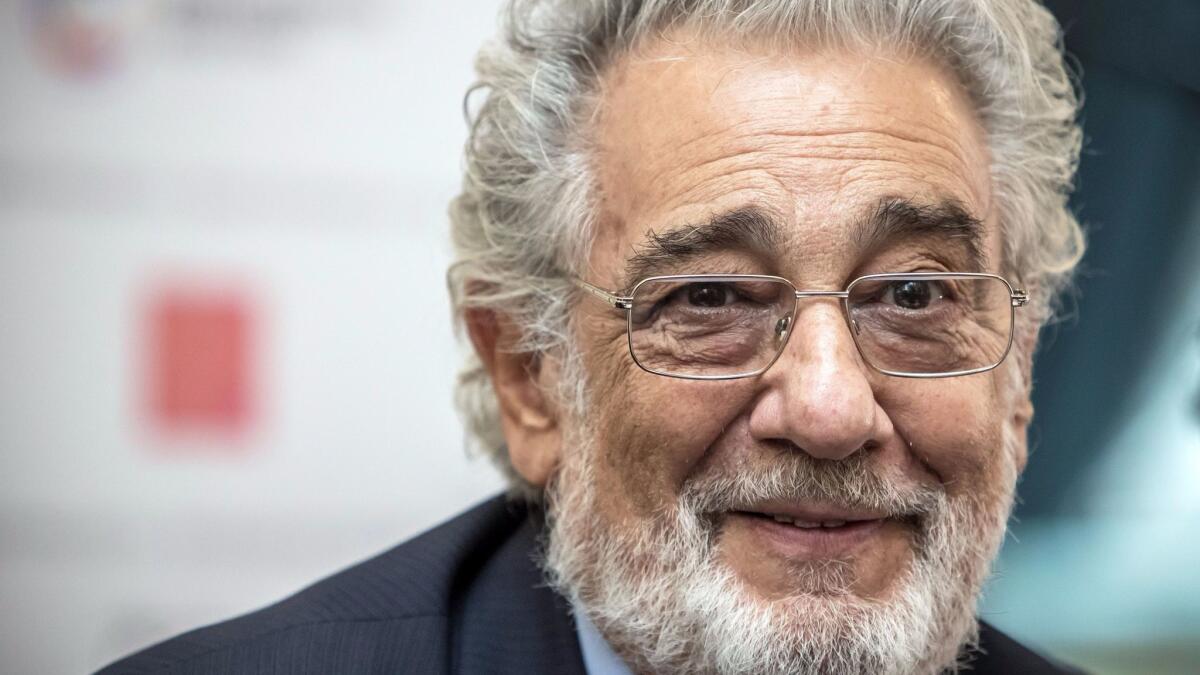How Plácido Domingo taught L.A. to love opera

- Share via
Plácido Domingo clearly has a pretty good memory. He’s sung 148 roles — mostly tenor throughout his 60-year career, although now at 76, he’s an active baritone — a record that has no chance of being broken in the foreseeable future, if ever. He’s conducted numerous more operas. He’s been responsible for presenting and also commissioning a bunch more works as an opera administrator. He’s accomplished impossibly too much, and is far too busy, to possibly remember it all.
He necessarily looks ahead, not back. “I rest, I rust,” is the motto he loves to repeat.
Sitting in his Dorothy Chandler Pavilion office at Los Angeles Opera, the company he helped found 31 years ago and now heads, Domingo agreeably makes an effort to reflect on his past, although he can’t resist readily transitioning to the present. Nov. 17 marks the 50th anniversary of his Los Angeles debut, and L.A. Opera is throwing a gala on that date to celebrate.
“It’s late of life,” Domingo cheerfully announces before allowing himself a brief indulgence in reverie. He will be 77 in January, so, he says, “it’s a must” to continue on as he still can, rather than rest on a warehouse full of rusting laurels.
I have the enthusiasm. I have the passion. I always say, when I hear, ‘the years are passing,’ I want them to pass. I don’t want them to stay.
— Plácido Domingo
“I have the enthusiasm. I have the passion,” he says. “I always say, when I hear, ‘the years are passing,’ I want them to pass. I don’t want them to stay.”
All of a sudden a date pops out of his memory. Feb. 22, 1966.
That night New York City Opera moved into the recently built State Theatre (now named for David H. Koch) at Lincoln Center. The feisty company promoted young singers, boasted low ticket prices and was dubbed the People’s Opera to distinguish it from the glitzy Metropolitan Opera. This was a big deal for New York, a big deal for American opera and, it turned out, a very big deal for Los Angeles.
City Opera went daringly all out, presenting the U.S. premiere of modernist Argentinian composer Alberto Ginastera’s “Don Rodrigo” in what was the most ambitious and spectacular production of the company’s 22-year history. Yet for all the news of the evening, seemingly all anyone could talk about afterward was the young, unknown tenor making his New York debut in the title role.
A year later City Opera chose that production and that tenor to open the first of what would be 17 seasons for opera-starved L.A. at the Music Center. The next night, Domingo was back onstage in “La Traviata” and praised in these pages for being “manly, temperamental … and blessed with a big well-focused, well-rounded tenor.”
What was Domingo’s impression of L.A. on his first trip here? He liked it, especially the weather, he says. He had a good time. He was impressed by the 3-year-old, state-of-the-1960s-art Dorothy Chandler Pavilion. But he was a young singer on the fast path to the top, ready to conquer the opera world, and L.A. couldn’t have meant that much to Domingo then. In 1967, it wasn’t the opera world.

Domingo left City Opera soon afterward, but he returned to the Music Center as a guest singer in 1970 and ’72. The year in between he appeared at the Hollywood Bowl in “La Traviata” with Beverly Sills and a just-starting-out James Levine conducting the Los Angeles Philharmonic. By then San Francisco Opera, the Metropolitan Opera in New York, La Scala in Milan, Vienna State Opera and Covent Garden in London were calling. In the meantime, City Opera would soon begin to lose its luster in L.A.
“I had first thought that City Opera was a great solution, that it was really going to pave the way for creating an opera company in L.A.,” Domingo says. “But it didn’t happen. The Music Center didn’t want it to happen.” Nor did the L.A. Phil, which began to put on opera itself.
Between 1972 and 1984, Domingo visited L.A. only for special occasions — appearing on Johnny Carson’s “The Tonight Show” or performing a benefit concert with Carlo Maria Giulini and the L.A Phil. But he sensed something stirring in the atmosphere.
The 1984 Olympics changed everything. London’s Royal Opera headlined the Olympic Arts Festival with three operas performed in the Dorothy Chandler, including the premiere of a new production of Puccini’s “Turandot” with Domingo.
The tenor and L.A. finally clicked. He appeared as a soloist in the “Ode to Joy” finale of Beethoven’s Ninth Symphony the night before the Olympics opening ceremony in a special L.A. Phil Hollywood Bowl program. He sang for 100 disabled children at an Italian restaurant in Santa Monica. He appeared in a solo concert at the Pacific Amphitheatre in Costa Mesa.
He also got chummy with L.A. opera activists, particularly three local attorneys — Don Franzen, Peter Funsten and Bernard A. Greenberg — who were fundamental in founding what would become Music Center Opera (later to be called Los Angeles Opera).
“I was always saying to them, ‘The people are hungry for opera,’” Domingo reminisces. “It was then, during the Olympics, that it was decided to form an opera company.”
The British manager Peter Hemmings was hired as director. Domingo became an artistic advisor. Just as important, he became the face of the company. He radiated celebrity, and it would be hard to imagine such a company having been formed at the time it was and the way it was without the benefit of that.
To get a sense of just the kind of local — and international — presence Domingo had become, in August 1986 the singer organized a concert, “Plácido Domingo & Friends,” at Universal Amphitheatre to raise money for the victims of a devastating earthquake in Mexico City. His friends were Frank Sinatra, John Denver, Julie Andrews and Kirk Douglas.
His itinerary for the next two weeks was: Mexico City to Berlin to Salzburg to Vienna to Berlin to Madrid to Paris to New York to Barcelona to L.A. to Denver to London to Madrid to Jerusalem to Tel Aviv to New York.
A month later, Music Center Opera opened with a celebrated production of Verdi’s “Otello” starring — who else? “The rest,” Domingo says with a knowing smile, “is history.” That is his perfect segue to the present.
Thirty-one years later, when Domingo is not singing onstage or conducting in the pit, he’s running the show. One of his first projects, having become general director of the company in 2003, was to create the post of music director, which went to Kent Nagano and, since 2006, James Conlon.
“I still have one thing to do, though,” Domingo insists. “I want to convince some of the big names to come and conduct,” three of them past and present L.A. Phil music directors. “We were lucky finally that Gustavo [Dudamel] came [for two performances of “La Boheme” last year], and we are trying to find a way for him to return. It would be great if we could bring back [Esa-Pekka] Salonen. And, of course, Zubin [Mehta].”
In fact, Domingo’s to-do list is large. There is the renovation of the Chandler, something that’s been talked about for years. Domingo says he still loves the theater.
“I think it works, but it will be better if we have fewer seats and improve the acoustics. And make it more beautiful. The other solution is if someone comes along and says, ‘I want to build a new theater.’”
My first dream is that by the turn of the decade we can do more productions now that we’ve balanced the budget.
— Plácido Domingo
“But my first dream,” Domingo says, “is that by the turn of the decade we can do more productions now that we’ve balanced the budget. I’ll be happy if we can add one more. I’ll be thrilled if we can do two more.
“As you know, opera is not a business, and my really big dream is that someone out of the blue gives us a huge donation. Many opera companies have had that. I would love to read in the Los Angeles Times that someone has given the company $40 million or $50 million.”
Until that time comes along, Domingo has ideas for stretching the dollars that are, he quickly adds, being generously donated by the L.A. Opera board. He’s fine with sharing productions with other companies to reduce the expense. The current lavish and quirkily inventive “Nabucco,” which Domingo dominates in the title role, is a co-production with three other American companies.
But Domingo is even more bullish on the use of technology in staging. Instead of bulky and expensive physical productions, he suggests projections. “Many productions today don’t mean anything,” he complains. “They might be staged in two boxes of different colors, one orange, one purple. You don’t know where you are, and audiences want to know where they are when they see ‘Aida’ [set in Egypt] or ‘Turandot’ [set in China].”
More plans for growth? Domingo notes that the company hosted a citywide Wagner festival when the budget-busting “Ring Cycle” was staged seven years ago but has done no Wagner since. That is about to change, he promises. (A Wagnerian, himself, Domingo will conduct “Die Walküre” at the Bayreuth Festival this summer.) He wants more new work, and, without naming them, hints that commissions are on the way.
“I feel really proud that Gustavo at the L.A. Phil and I are Hispanic or Latino,” he says while adding yet another challenge, “but I think we have to do more for the Latino community.”
Domingo remains active running Operalia, the contest he founded that funnels young singers into opera companies all over the world. You might say he remains active running, and leave it at that.
He mentions having just gone to New York on a free day between performances at L.A. Opera to see his grandchildren. He filled another short break opening a theater complex in Guadalajara. He likes nothing better, he says, than opening theaters because of all the promise they hold. Then there is the quick trip to Prague to conduct a special performance of “Don Giovanni” to mark the 230th anniversary of the Estates Theater, where Mozart’s opera had its premiere.
“I have time as long as I have life,” Domingo sums up his philosophy. “If I am in good health and if the planet exists.”
Once more, Domingo refuses rest when there is a pressing challenge, and he’s off on a new tangent: the recent profusion of natural disasters.
After Domingo announced that he would donate a portion of the ticket sales from a concert at San Antonio’s Alamodome to American Red Cross disaster relief, the event was postponed lest it compete with basketball in Houston that night. He’s a huge sports fan and attended the seventh game of the World Series in Dodger Stadium, yet Domingo nonetheless laments that “of course, sports wins over the arts. I was sorry because we wanted to do it very much to help Houston, Puerto Rico and Mexico.”
Even so, impossible is not a word associated with Domingo and his storied career. Opera as it is in L.A., and particularly at the Music Center, for instance, would have seemed impossible 50 years ago. The last week alone it was possible to hear six operas — from the 17th century through this minute — on and around the campus, with a pair of Baroque operas brought by Les Arts Florissants, a pair of operas presented by the L.A. Phil (Ravel’s “L’Heure Espagnole” and the premiere of Annie Gosfield’s “War of the Worlds”), and L.A. Opera’s productions of “Nabucco” and Keeril Makan’s recent work based on the Bergman film “Persona.”
In most other places, that would be called a festival. In L.A. what was once unthinkable pre-Domingo is almost becoming normal.

♦ ♦ ♦ ♦ ♦ ♦ ♦ ♦ ♦ ♦
Plácido Domingo 50th anniversary concert
What: Uzo Aduba, Garth Brooks and Kristin Chenoweth host a gala featuring Janai Brugger, Arturo Chacón-Cruz, Mario Chang, Michael Fabiano, Ermonela Jaho, Nino Machaidze, Ana María Martínez, Liudmyla Monastyrska and conductor James Conlon
Where: Dorothy Chandler Pavilion, 135 N. Grand Ave., L.A.
When: 7:30 p.m. Nov. 17
Tickets: $284-$399
Info: (213) 972-8001, www.laopera.org
MORE NEWS AND REVIEWS:
With Plácido and L.A. Opera, ‘Nabucco’ still has the power to provoke
Shakespeare in Disney Hall: An L.A. Phil ‘Dream’ deferred
Russia’s secret weapon? Valery Gergiev and the rapturous Mariinsky
More to Read
The biggest entertainment stories
Get our big stories about Hollywood, film, television, music, arts, culture and more right in your inbox as soon as they publish.
You may occasionally receive promotional content from the Los Angeles Times.











